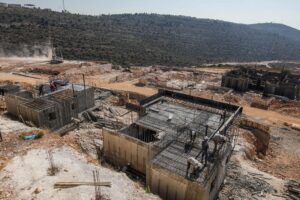Lake Salda Recognized Among World’s Top 100 Geological Heritage Sites

Burdur, The Gulf Observer: Lake Salda, a stunning natural oasis located in Türkiye’s southwestern Burdur province, has been honored as one of the “Top 100 Most Important Geological Heritage Sites in the World.” The prestigious recognition was announced during the 37th World Geological Congress, held in Busan, South Korea, from August 25 to 31.
The inclusion of Lake Salda on this esteemed list is part of an initiative by the International Union of Geological Sciences (IUGS), with support from UNESCO. The lake, renowned for its turquoise waters and white sandy shores, surrounded by lush green hills, stands as a significant geological and ecological site.
Nizamettin Kazanci, Vice President of the Turkish National Commission for UNESCO, confirmed the inclusion of Lake Salda and expressed pride in this international recognition. “Being on the list means better protection for Salda. We need to protect Lake Salda much better,” Kazanci stated. He emphasized the collaborative efforts of various public institutions to ensure the lake’s preservation amidst increasing tourism, urging visitors to respect the sensitive areas and contribute to ongoing protection initiatives.
Located in the Yesilova district of Burdur province, Lake Salda is a highly alkaline lake situated at an altitude of 1,193 meters within the Taurus Mountains. The lake, with a depth of 184 meters and an area of 44 square kilometers, is known for its rich magnesium content, which gives its sands a distinctive white color. The lake’s unique geobiochemical ecological process fosters the formation of hydromagnesite-rich stromatolites on its bed, resembling ancient fossils that first appeared on Earth around 3.5 billion years ago. These modern stromatolite formations are a rare phenomenon, making Lake Salda an invaluable site for scientific research.
Nicknamed “Mars on Earth,” Lake Salda has drawn the attention of the National Aeronautics and Space Administration (NASA) due to the similarities between its mineral deposits and those found around the Jezero Crater on Mars. NASA has suggested that studying Lake Salda could provide insights into the search for fossilized traces of microbial life on the Red Planet.
The pristine beauty of Lake Salda has faced threats from pollution, exacerbated by the growing number of visitors and the presence of irregular structures around the lake. In response, the Turkish government designated the lake as a Special Environmental Protection Area in 2019. The Ministry of Environment and Urbanization has since implemented measures to safeguard its ecosystem.
Research efforts by nongovernmental organizations (NGOs) and universities continue to explore the biodiversity in and around Lake Salda. To further support scientific research, a science center is being established at the site, which will also be available for use by NASA to advance studies in microbial ecology and biodiversity.
The recognition of Lake Salda as one of the world’s top geological heritage sites underscores its global significance and the need for sustained conservation efforts to preserve this natural wonder for future generations.


